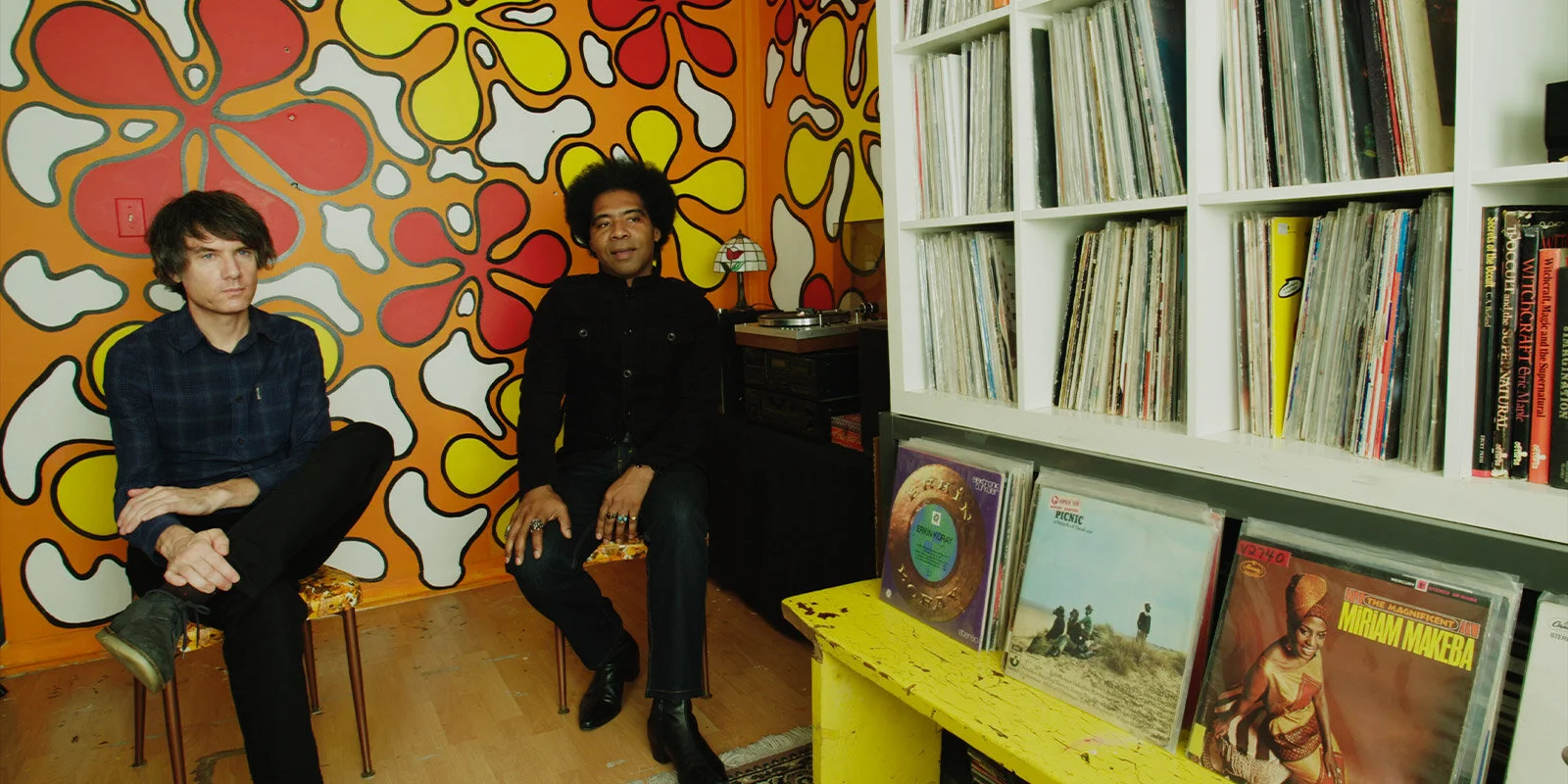Filmmaker Alan Zweig takes a more upbeat look at record nerds, 21 years after Vinyl
At VIFF, the director takes another look at the power of music and the drive to collect
Records
Vancouver International Film Festival screens Records at the Rio Theatre on October 7 at 6:15 pm and streams online via VIFF Connect from October 1 to 11.
RELEASED IN 2000, the documentary Vinyl inhabits an uncomfortable place in the memory of—well, people like me, to be perfectly honest—who maybe saw themselves implicated in filmmaker Alan Zweig’s ruthlessly funny, often very sad interrogation of the psychology of record collectors.
As a middle-aged grouch reckoning with his own compulsions, Zweig more than just implicated himself in the film; he pointed his shitty Hi-8 camcorder at a mirror and spoke directly to the viewer, introducing a persona that persisted and grew in tandem with his eccentric career. In subsequent films like I, Curmudgeon (2004) and 2015’s extraordinary portrait of Steve Fonyo, Hurt, Zweig has always been good, if not always easy company.
He goes back to the source with his latest film. While once again introducing us to an array of crate-digging obsessives including Vancouver-adjacent folk like filmmaker Reg Harkema and the mighty Kevin James Howes (aka DJ Sipreano), Records is a kinder-gentler beast than its predecessor. So is Zweig. Reached at his Toronto home, I confess to the filmmaker that I couldn’t bring myself to go back and rewatch Vinyl—too painful!—and that the two films seems to be in a kind of dispute with one another. His reaction, and in fact our entire interview, was like the movie itself: discursive, thoughtful, winding, darkly humorous, as if Zweig’s waking life is spent largely doing therapy on himself, and probably his sleeping life, too.
“I have to say,” he begins, “you saying what you just said, that you can’t watch Vinyl—as much as I can imagine somebody saying, ‘Why? Why can’t you just watch it?’—that’s sort of the nicest thing anybody’s said, and maybe will ever say about this film. Because, you know, I think that this is the most self-indulgent film I’ve ever made in that, for me, Vinyl was an earth-shattering, life-changing moment, and I’ve always felt somewhere in the back of my mind that I would return to it, but I had this other thought, which was, ‘Why don’t you just make a normal record collecting film? Why don’t you make that your sequel? It’s the one where you don’t talk, and there is no mirror, and you don’t talk about Vinyl, you just make a normal movie about record collecting, why can’t you do that?’ But no, I couldn’t do that, so… you know.”
Sure, we know, except that we don’t expect a normal movie from Zweig and, in any case, his hangdog style (imagine something like Gary Shandling mixed with the Shroud of Turin) is always welcome—especially now that the 70-something filmmaker has found a more digestible balance inside the basic Zweig binary of compassion and self-loathing. In Records he reflects on his career, on Vinyl, on himself, literally, with his iPhone once again pointed at a mirror, improvising monologues that are sometimes interrupted by his nine-year-old daughter or his own slightly slapstick equipment struggles. But it’s a more contented man than the Zweig of 21 years ago. Isn’t it?
“There are mirror pieces in the film that kind of have no reason to be there,” he decides, with no prompting from me. “Some people will be, like, ‘Why are you talking about being overweight in your film about record collecting?’ And the reason, on the simplest level, is that I didn’t want to make a film where I said, ‘I’m all better now! I’m good!’ There’s a Loudon Wainwright song on his first record, which is a good record, when he was more angsty, it’s called ‘Glad to See You’ve Got Religion’, and it’s him talking to his friend, who’s better, and he says, 'I’m glad to see you got religion, but I’m still fucked up.’ I think I’m being very positive in the film, in general, but I just couldn’t let myself be that positive and uplifting without admitting that I’ll never be Tony Robbins. I’ll always be Harvey Pekar.”
That said, the immediate difference between Vinyl and Records—besides Zweig’s evolved visual style—is its cheeriness. One of the film’s running inquiries is whether couples mingle their collections. (Usually not, it turns out.) There’s a brief return to the eternal conundrum, posed in Vinyl, of whether Zweig is encountering a music lover, or something else entirely. (“Whatever reason people have records for,” he says, “they are getting pleasure from it. I don’t judge! I don’t judge!”) By and large, however, this decade’s model of record nerd is apparently healthier, well-dressed, living better. “People like dysfunction, people like negativity, and I do too,” says Zweig. “I like darkness, I like weirdness, I like when I’m making something sad, I feel like I’m in my comfort zone. Trying to make something sweet, which I think this film is, was really hard! It was almost like I have no judgment over what is entertaining and sweet.”
“The people in Vinyl who are the most extreme,” he continues, “like the K-Tel guy, or the guy who lost all his records to his wife, or the guy who had the records on the floor—I wasn’t looking for them, they were just what was available at the time. This time they didn’t come to me. Now, it might be because I was making an effort to hit a wider demographic swathe. Maybe if I stayed in the white-men-my-age group exclusively, I might have found one of those old fashioned hoarders. The thing is, I think it has a lot to do with my own judgement, because there are a couple of people in the film who are pretty extreme, who I feel like if they’d been in Vinyl, they would have come off as more crazy than they come off in this film, because I like them. Even in Vinyl with the crazy people, I had admiration for them, I had understanding for them, but I wasn’t making that film. I think that’s what it all comes down to. I don’t know. I was judgemental. I was projecting. That’s the whole point.”
It’s significant that Records leaves the viewer amped to do their own crate-digging. It’s like we’ve made peace with a conversation that started 20 years ago. Zweig is impressed to hear about the pristine copy of Scott Walker’s first album (Scott, 1967) that I found the day before our call at a Gulf Island Fall Fair, the most unlikely venue imaginable for an item that wasn’t even released in Canada, but that’s how it goes. “Yeah, that is how it goes,” he says. We talk at some length about the under-appreciated work of the Monkees’ Mike Nesmith—the subject of one of his sentimental digressions in the film. I press him for details about the vintage Canadian psyche bands Christmas and Reign Ghost, whose singer-guitarist Bob Bryden is among Zweig’s interviewees. The movie has done its job; listen to us go! And Zweig being Zweig, he’s still beating himself up over it.
“The other thing that’s weird about this film is that it is my eleventh feature doc,” he says. “That means nothing, but somehow, I never thought I’d get to 10. When I got to 10, I felt like, okay, all bets are off, you have this 10, that’s your legacy, from now on till they make you stop, you can do whatever the fuck you want and if that’s a bunch of nature docs or history channel things or films about World War II—that’s okay. I’d forgive you if you go and become a conventional documentary filmmaker now. And then the first one I make is, like, maybe more fucked up than anything.”













